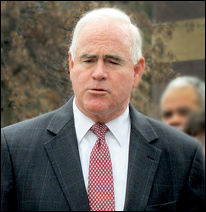By Jim Ellis
Jan. 29, 2018 — The alleged sexual harassment situation involving four-term Pennsylvania Rep. Pat Meehan (R-Chadds Ford) culminated with his retirement announcement, last week.
In a letter to Speaker Paul Ryan and his local Republican Party chairman, Meehan wrote that he will not be a candidate for a fifth term in November. But, his personal situation may not be the only reason that voluntarily leaving Congress makes sense for him.As we’ve discussed on several occasions, the Pennsylvania state Supreme Court invalidated the state’s congressional map earlier this week on grounds that the empowered Republican political apparatus took partisanship too far in constructing the 2011 plan. The GOP will try to flip this case into federal jurisdiction — the US Supreme Court has never ruled a map invalid because of political gerrymandering, and are actively considering several such cases during the current term — but the party’s prospects of doing so are likely poor.
If the state high court’s ruling stands, the legislature and governor will be forced to present a new map to the Justices by Feb. 15 in order to keep pace with the current election calendar. The short deadline will likely avoid compelling the court to delay the state’s March 6 candidate filing deadline and May 15 primary election.
Now with a Democrat governor in office, and not the Republican that signed this map into law, it is highly probable that a veto will occur over the next GOP iteration. If so, then the court will appoint a special master to draw the new map.
The redistricting situation matters greatly here because Meehan’s District 7 is the exemplary focal point for claiming that the map is gerrymandered. Its irregular, craggy shape makes it easy to argue that at least the Philadelphia suburban region was deliberately constructed for partisan political gain. The twisting and turning 7th District also helped Republican map drawers pave the way for Republicans Ryan Costello (R-West Chester) and Brian Fitzpatrick’s (R-Levittown) predecessors to likewise have favorable districts.
Being weakened with the sexual harassment controversy and presumably having to run in much more Democratic territory became the key political factors leading to Meehan’s retirement decision, especially with both simultaneously exploding within the last few days. It now becomes entirely probable that the Republican map drawers could possibly concede the 7th District to the Democrats in order to disperse enough Republican voters to shore up Reps. Costello and Fitzpatrick in the neighboring CDs.
The Meehan retirement brings the total number of open House seats to 50, with three in special elections — including the 18th District of Pennsylvania on March 13 — to be decided before the regular election cycle concludes. A fourth special, that for the open MI-13 District (resigned Rep. John Conyers, D-Detroit), is scheduled to run concurrently with the regular election cycle and will remain vacant until after the Nov. 6 election.
Of the aforementioned 50, Republicans must protect 35 seats as compared to the Democrats’ 15. Looking at the Republican 35 opens, three, including PA-7, appear headed for Democrat conversion with three more in toss-up mode. On the other hand, four of the Democrats’ 15 incumbent-less seats can also be reasonably considered as toss-ups.
With an open PA-7 likely facing a re-draw, it is probable that this new seat will rate as Lean Democratic, if not stronger.

